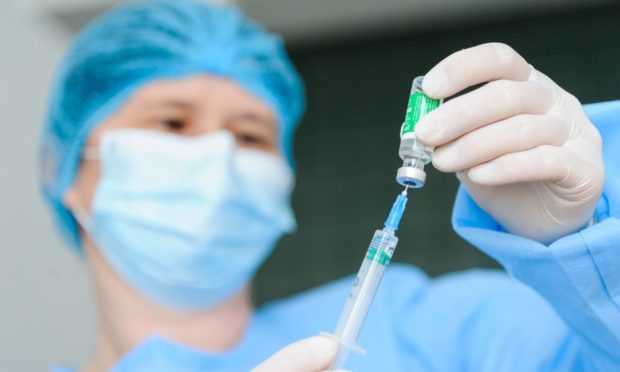Last Tuesday I took my first step back along the road to normality.
I received my AstraZeneca vaccination from a friendly nurse at the vaccination centre in Greenock town hall.
There was no fuss, no drama as people turned up, waited their turn, got their jag and like me, breathed a sigh of relief that the threat of serious illness or death from catching Covid was about to end.
When the pandemic arrived in the UK, who could have predicted that nearly 130,000 people would lose their lives, the economy would tank, we would lose our freedom and many people would lose their jobs.
On a personal level, months of being locked down, never seeing family or friends has begun to take its toll.
When I was farming, I was used to working on my own, but this is different.
Stuck in the house working online day after day has become unbelievably repetitive and personally suffocating.
Recently we have lost family and friends who were ages with me and it brought home how vulnerable I am to Covid. For the first time in my life I have had to confront my own mortality.
That rather depressing thought spurred me into updating my will and sorting out my affairs just in case.
Vaccination however is a turning point.
It has given us all hope and optimism that this life-threatening pandemic can be beaten, and we can look forward to a return to normality by the middle of the summer.
After all the stumbles and missteps by the Johnson government in its early response to Covid it has at last got it right with the vaccine rollout.
The procurement of the vaccine and the rollout in the UK has been truly world leading and it is already saving many lives.
However, speaking to many of my European work colleagues it is a different story.
They have no idea when they might get a vaccine and as a third wave of Covid hits many European countries hard there is no end in sight to lockdowns.
In many ways the EU’s failure to procure vaccines and the shambolic rollout highlights everything that in my experience of working in Brussels is wrong with the way it operates.
The unwieldiness, the bureaucracy, the torturous decision-making process and aversion to risk makes it almost impossible for the EU to react swiftly and nimbly to a crisis.
EU leaders desperate to avoid blame for the vaccine crisis have resorted to blaming AstraZeneca, questioning the effectiveness of its vaccine and threatening to block supplies to the UK.
To make matters worse the erratic response from EU leaders is undermining public support in Europe for the AstraZeneca vaccine despite the European Medicines Agency insisting it is safe.
And let us not beat about the bush – people are dying unnecessarily because of that failure.
As a pro-European it pains me to say it, but we are extremely fortunate the UK went its own way and delivered a world beating vaccine rollout that is saving so many lives already.
What is utterly impressive however is the fact that our scientists and our pharmaceutical companies have managed to produce highly effective vaccines in record time.
A truly astonishing feat given it usually takes at least 10 years to develop a vaccine and get it approved for use.
It has been the scientist’s ability, to use precise genetic engineering and modification techniques, that has made possible at such speed the miraculous development of these life saving vaccines.
And they can rapidly modify the current vaccines to deal with any new variants of Covid that might arise in future.
Quite literally genetic engineering has become a life saver in the world’s first modern-day pandemic.
Science has come up trumps.
What is astonishing is the silence of the doom mongers and anti-science brigade who for a generation fought tooth and nail to block farmers in the UK and Europe from using this technology.
What has happened to the politicians and green activists with their dire warnings of Frankenstein foods?
Have they stood by their ideology and refused their shot of the vaccine or have they quietly put their anti-science views to one side and rolled up their sleeves and taken the jab?
From a farming perspective, the triumph of science over the virus hopefully ushers in a new era of trust in science and support for science-based decision making on new technologies.
The low-key reaction by the media and the green NGO’s to the UK Government consultation on new plant breeding techniques does seem to indicate a more mature approach to the debate.
It has also been refreshing to see a Prime Minister and a Defra Minister come off the fence and champion the use of the technology in delivering a more sustainable agriculture.
For Scottish farmers however, the big question is whether Scottish Government Ministers will show the same leadership and back the use of this technology in Scotland.
Unfortunately, I suspect unless it benefits the cause of independence the answer will be no.
- George Lyon is a former MEP and a former president of NFU Scotland. He is a senior consultant for Hume Brophy.
